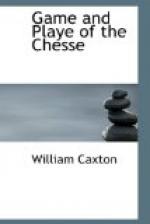Amongst other versions of the story is a novelle by Giovanni Brevio, published as part of his “Rime” in 1545. Piron’s comedy of “Les Fils Ingrats,” also known as “L’Ecole des Peres,” appeared in 1728. “The story,” adds Dunlop, “is also told in the ’Pieuses Recreations d’Angelin Gazee,’ and is told in the ‘Colloquia Mensalia’ of Luther, among other examples to deter fathers from dividing their property during life among their children—a practice to which they are in general little addicted."[33]
There is yet another verfion of the story in John of Bromyard’s “Summa Predicantium.” After describing the discovery of the club it says, “in quo Anglice scriptum erat”—
“Wyht fuyle a betel
be he smetyn,
That al the werld hyt mote
wyten,
That gyfht his sone al his
thing,
And goht hym self a beggyn.”
Mr. Wright gives another version, and adds that he is inclined to think that the story and verses had some connection with “a superstition not yet forgotten, which is thus told by Aubrey in his ‘Remains of Gentilism’” (Thorn’s “Anecdotes and Traditions,” p. 84)—“The Holy Mawle, which they fancy was hung behind the church door, which when the father was seaventie, the sonne might fetch to knock his father in the head, as effete and of no more use."[34]
Herodotus has attributed the same unfilial conduct to some Indian tribes.
The incident of St. Bernard playing at dice for a soul (p. 151), is in the “Gesta Romanorum.” The anecdote how a son induced his father to become a monk (p. 81) which is quoted from the “Vitas Patrum” is also in the “Gesta Romanorum,” and has so much of the Buddhist flavour as to give rise to the suspicion that it comes from an Oriental source.[35] The story of two merchants quoted from Petrus Alphonsus is also in the “Gesta Romanorum.” It is the foundation of Lydgate’s “Two Friends,” and is beyond doubt an Eastern importation. In a MS. of the “Speculum Laicorum,” described by Prof. Ingram, the writer has transformed one of the merchants into an Englishman.[36]
The story quoted from “Paul, the historiagraph of the Lombards” (p. 46), is also given in the “Gesta Romanorum.” Mr. Herrtage says it is “evidently founded on the classical legend of Tarpeia.” The narrative in the chess-book is taken from Paulus Diaconus.[37]
The stratagem by which deposited money was recovered from a dishonest trustee (p. 114) is told by Petrus Alphonsus, and is also in the “Gesta Romanorum.”
The story of the danger of drunkenness (p. 129) was a favourite with our forefathers. It is given by John of Bromyard, and is the subject of a fabliau which is given by Meon.[38]




